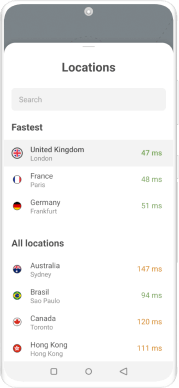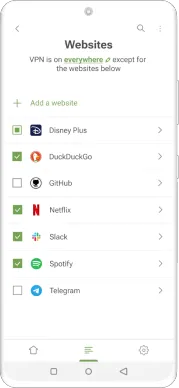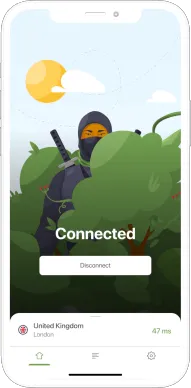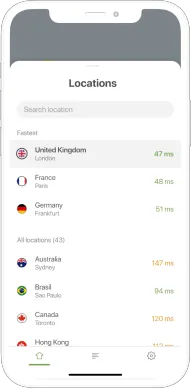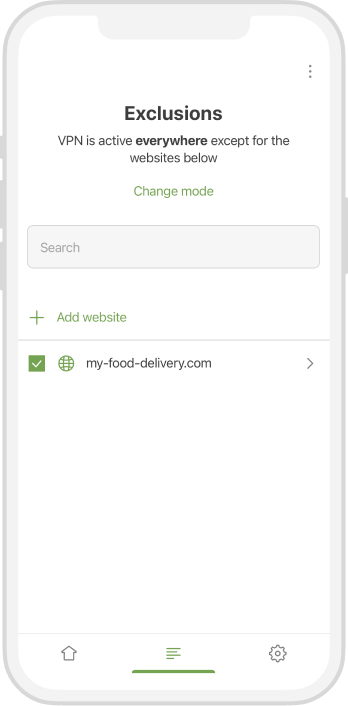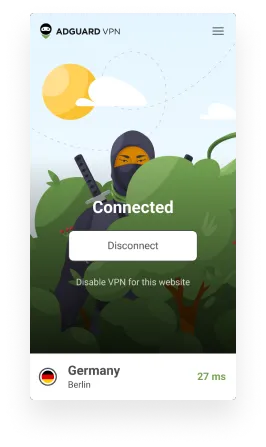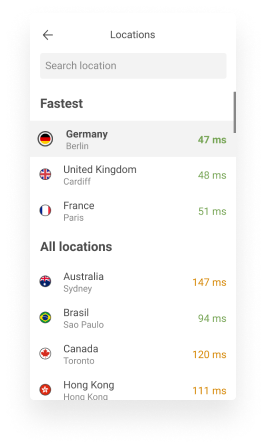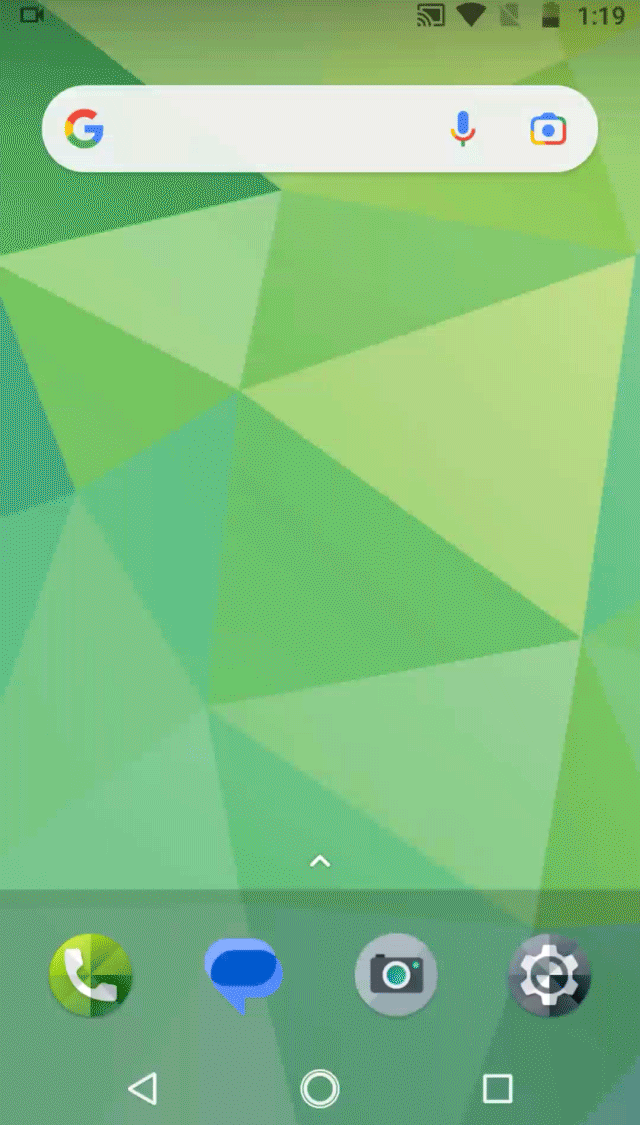Do I need a VPN at home?
A Virtual Private Network or VPN is an effective and popular technology to improve your online privacy and security. VPN is indispensable while connecting to vulnerable free Wi-Fi networks in public places, but do you need a VPN at home? Read the article to find the answer.
What is a VPN and why do I need it at home?
VPN software creates an encrypted tunnel between your device and the VPN server for your Internet traffic. Your browsing, searching history, and all online activity are securely protected on the way to the VPN server and back, so your ISP or other users cannot catch what you're doing online or intrude into any of your data.
With VPN you can:
Securely protect personal information against surveillance. Users' data is valuable not only for hackers or marketers. The government and a lot of third-party companies want to get their hands on it and use it for their own interests, too. VPN encrypts all information you send and receive over the Internet. Anyone who wants to get some of your private information first needs to decrypt stolen data, but it’s almost impossible, especially when you use a trustworthy VPN with reliable encryption.
Mask your IP address and stay anonymous online. Internet Service Provider (ISP) assigns a unique IP address to your router, through which user’s different devices might connect to the web. On this stage the ISP no longer knows how many devices are behind the router and what they are. However, your IP address reveals your location, and acts as a temporary identifier by which it’s possible to gather fragmentary details about your activities into a more complete picture.With VPN you can hide your actual IP address behind another IP of the VPN server you choose. This masking makes it harder to monitor your online activity and helps you keep it private.
Increase online security against cyber criminals. Firstly, VPN encryption protects your information from everyone who wants to read it. Secondly, a VPN redirects your traffic through the VPN server and masks your IP address. This prevents all cyberattacks that require access to your IP.
Bypass geo limitations. Some platforms restrict access to users based on knowing their location. With a VPN you route traffic through a VPN server in another country, and your device can get the required IP address.
Make it harder for ISP to track your online activity. If you don’t use VPN, your browsing history is not a secret to your ISP. This information can be stored and sold to different companies, which might use it for their own purposes, but also might lose it if not stored and protected properly. If you don’t want to be an object of surveillance, turn on the VPN. In this case, your ISP sees only that you use a VPN, but cannot know more.
Three things a VPN can't help with
VPN provides many security benefits, but anyway it’s not a universal solution for all situations. There are three things VPN can’t help with:
- Directly protect your device from malware. VPN effectively secures online traffic but doesn’t shield your device from viruses, trojans, or ransomware. VPN can’t scan files downloaded from the Internet (which may be infected), hunt down, or remove malware from your laptop. You need to use antivirus software for this purpose.
- Mask your online account activity. If you turn on a VPN and log into your account on some service or website, the platform identifies you and sees all your account activity even when you mask your IP address with a VPN. Remember it, and keep in mind how much information about yourself you leave online.
- Stop cookies from tracking you. Cookies are small text files that are used to identify your device and send you information based on your previous session. Even when you use VPN cookies are allowed to be stored in the web browser. VPN can’t clear existing cookies, can’t grab them and save them on a VPN server instead of your device. Usually, cookies are safe, but they can be used to monitor your online activity. The best thing you can do for your online security is to clear cookies before and after each VPN session.
Why do I need a VPN at home for all devices?
The best way to create complete online protection is to use a VPN for all devices that can be secured with it. Imagine the next situation, you use VPN only on a laptop, but don’t install it on your smartphone. In this case, all your mobile traffic is unprotected from tracking and you keep leaving plenty of digital footprints every time you connect to the web.
Nowadays a lot of different physical things can connect to the Internet and transmit data without the help of a human. VPN is not intended to be used on IoT devices, but they still can be protected with DNS technology, which allows to:
- Monitor with which websites your IoT devices communicate.
- Limit the domains with which IoT devices are able to resolve.
- Restrict access to certain domains and allow access to others.
- Avoid connecting to potentially harmful websites.
How to install AdGuard VPN
Installing AdGuard VPN is quick and easy. We prepared step-by-step installation instructions for Windows, Mac, iOS, and Android.
How to install AdGuard VPN for Windows
- Go to the website and click Download. You can find the file in the downloads list of your browser.
- Open the file and click Install. AdGuard starts the installation process, you don't have to do anything else.
- Wait for the message “'Installation completed successfully” and click Finish.
That's all, AdGuard VPN for Windows is ready to protect you.
How to install AdGuard VPN for Mac
- Click the link to download the AdGuardVPN.dmg file.
- Open the DMG file and double-click the icon on the screen “Install AdGuard VPN”.
- Click Continue and Install to launch the AdGuard VPN installer.
- Click Close after you see the message that “The installation was successful”.
That's all, AdGuard VPN for Mac is ready to protect you.
How to install AdGuard VPN for Android
- Follow the link to the AdGuard VPN page in Google Play Store.
- Tap Install.
- Tap Open after the installation process completes.
That's all, AdGuard VPN for Android is ready to protect you.
How to install AdGuard VPN for iOS
- Tap the link and click the App Store button.
- Tap Get and download the app.
- Wait for the app to load and tap Open.
AdGuard VPN for iOS is ready to protect you.
Why AdGuard VPN
If you are looking for reliable, safe, and up-to-day online protection look closer at AdGuard VPN. We provide VPN solutions for Windows, Mac, Android, and iOS with special features:
- Proprietary VPN protocol. The AdGuard VPN protocol is hard to trace because it's indistinguishable from regular HTTPs traffic — the most popular encryption method in the world. Also, AdGuard VPN uses the HTTP/2 and HTTP/3 transport protocol which keeps a high Internet connection speed, so important for normal Internet surfing. That’s why our customers needn’t choose between a fast stable connection and privacy — they have both.
- DNS server of your choice. Usually, the DNS server is provided by your ISP or router by default. With AdGuardVPN you no longer need to rely on the ISP choice and can use any DNS server from many well-known providers. Moreover, you can configure a DNS server at your sole discretion and block ads, filter the content, and get additional protection from tracking or phishing.
- The fastest VPN server locations. You can check how fast a data packet from your computer reaches the VPN server and returns and can choose the server location with the lowest ping. AdGuard VPN has a lot of VPN servers around the world and all the time adds new locations so you can choose from a variety of options.
- Lists of exclusions. AdGuard VPN allows you to create lists of websites on which the VPN will or will not be active. For the user's convenience, it’s also possible to export and import ready-made lists.
- Compatibility with AdGuard Ad Blocker. We have solved the problem of mobile applications that usually interfere with each other when installed on the same device. AdGuard VPN and AdGuard adblocker are fully compatible. You don't need to choose between apps and can take advantage of using both applications.
- QUIC protocol support. QUIC is the latest protocol, which not only provides advanced encryption but also improves connection quality under non-ideal conditions.
- Kill Switch. It controls the active VPN connection status and automatically disconnects the Internet if the VPN loses connection. This useful feature is essentially needed when you use the Internet in public places and guarantees that your data are protected all the time.
- Split tunneling. This feature is like the lists of exclusions that we mentioned before, but in this case, you can create lists of applications.
- Auto-protection. With the feature, you’ll never forget to turn on a VPN. It will activate automatically when you connect to vulnerable Wi-Fi networks in public places.
- Supporting up to five simultaneous connections. Unlike most VPN providers, AdGuard VPN has no limits on the number of devices you can log into your account. Also, you can connect to the VPN on five devices at the same time.
- Safe streaming. VPN helps to bypass geo-restrictions. And some services, in particular streaming video services due to different reasons, block access for VPN users. Market leading VPN providers do their best to provide unrestricted access to all services.
- Dark mode. Many users like dark mode, so we added this feature to our VPN.
FAQ
Why do I need a VPN at home?
Even though home networks are more secure and protected it’s always a good idea to use VPN to take your online privacy and security to the next level. With VPN you can significantly increase your anonymity and protect your browsing activity on all devices in your home from prying eyes.
What are the disadvantages of VPN?
VPN might significantly slow down your internet connection speed. It happens due to data having to pass a longer distance to reach the VPN server. Also, good premium VPNs cannot be free, you have to pay for the unlimited version. In some countries using VPN is severely restricted, but despite this, we at AdGuard do our best to make a VPN available everywhere.
What could happen if I don't use a VPN at home?
Firstly, you put your online safety at risk, making it easy for your ISP and different websites and services to track, store, and sell your data. Secondly, you don’t protect your personal information, leave a lot of digital footprints and become an easy object of surveillance for marketers, advertisers and even the government.
Is it possible to hack a VPN?
Yes, like any software, a VPN can be hacked. But it is not a real threat for a good trustworthy VPN service with advanced security. Anyway the best option to protect yourself is to be sure that your VPN doesn't store your personal data. In this case you are protected from VPN's data leakage or hacking.
Is it safe to use VPN?
We can’t say for others, but using AdGuard VPN and probably other top-notch VPNs is totally safe. Premium VPNs provide strong encryption, don't log, collect and sell users' data to third-party companies. That’s why it’s better to stay away from unreliable free VPNs.
Can VPN see my Internet activity?
When you use a VPN, all your Internet traffic goes through a VPN server and technically the VPN provider can see it. But, remembering the fact that almost all web traffic goes through HTTPS nowadays and stays opaque for any parties in the middle (including a VPN provider), it’s safe to say that the most valuable thing the VPN provider can extract from your traffic is visited websites. To summarize, a VPN might monitor and store some of your data, but does not have access to sensitive data like passwords and payment data, if they are properly secured by the websites you visit. Besides that, if you use good respectable VPNs with clear Privacy policy that won’t ever happen.
Can police track VPN?
Police can’t track real-time, encrypted VPN traffic, but with a court decision, they can request this data from your Internet Service Provider. If you use a VPN, the ISP sees it and directs the police to the VPN service provider. How much information the police can get depends on the log police of your VPN privacy policy. Trustworthy VPNs provide a no-log policy.
Does a VPN hide Internet activity?
Yes, VPN hides your online activity. Let’s look at how it works. If you do not use a VPN, all unencrypted browsing and searching goes on the Internet through your ISP. And it’s not a problem for them to read and see your web activity. With VPN traffic encrypted before it leaves your device, the ISP can’t see what exactly you are doing online. Data gets decrypted only after reaching the VPN server which further sends it to the designated website. The website will perceive this traffic as coming from the server's IP address, and not from yours. All this process securely masks your online activity.
Does a VPN hide your phone location?
Yes, VPN replaces your IP address and this hides your phone location. But it’s still possible to identify your geographical location with GPS, which is widely used by various mobile apps.
Should I leave VPN on all the time?
Yes, it’s a good idea to leave your VPN switched on all the time. It could dramatically increase your online security and privacy. This is especially important when you visit un/non-encrypted websites or use p2p clients like torrents.












